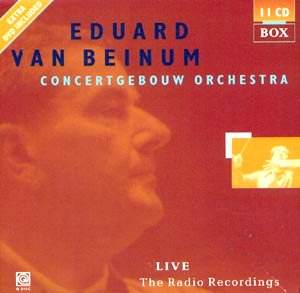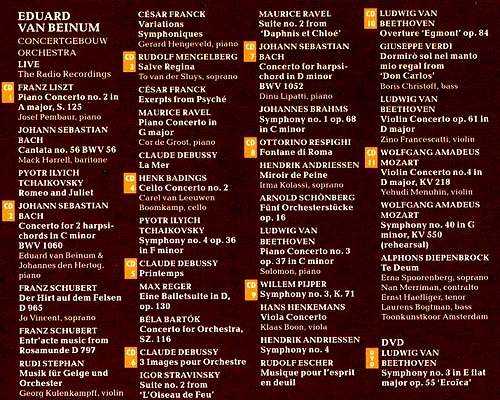Eduard van Beinum
The Radio Recordings
Concertgebouw Orchestra, Amsterdam
Q Disc 97015 [11 CDs + DVD]
Amazon
US $134.97


Eduard van Beinum (1900-1959) was slow
to win the Concertgebouw public's affection following Mengelberg, but came
to be adored by his musicians. After a long period of failing health, van
Beinum died in 1959 of a heart attack whilst rehearsing the orchestra. This
testimony to a life for music, and through the Nazi occupation of Holland
(broadcasts from 1935-58), was released for the centenary of his birth. A
lengthy sampling of the voluminous boxed set has given me great pleasure
and not a little pain. I have tended to avoid those standard works in which
orchestral colour and timbre are paramount. Some of the transfers from early
acetate discs are of execrable quality and hard to listen to through all
the incidental noise; it was the policy of the remastering team not to attempt
to eliminate all the surface noise, clicks and scratches, and to 'retouch'
rather than 'restore'. But the earliest are by no means the worst and many
are fully acceptable.
Best, however, to start backwards, I suggest. The DVD of the Eroica
from a Liberation Day Concert in 1957 pleased me a lot. Van Beinum's quiet,
unostentatious conducting manner is deceptive; he is in complete control,
but his baton style and body language is straightforward and unexaggerated,
a steady interpretation of the score with no idiosyncrasies. I found it very
satisfying and behind the black & white picture (my wife thought they
all looked like ghosts!) the sound is perfectly adequate to make you forget
its age.
CD No.11, recorded in 1956, was equally rewarding. There is a 'rehearsal'
of Mozart's G minor symphony - actually little more than a complete run through
with minimal interventions, they knew it so well. Clear and lucid, everything
in place and easily heard. Some detail worked on, only in the third movement
Trio; everywhere quiet kindliness, and courteous responses to questions -
all over in half an hour. Just as good as a polished performance (rehearsal
often are so). On the same disc Menuhin, in good form for Mozart KV218, in
Vienna during the orchestra's historic tour - 'the city transformed into
one huge party' in honour of the great visiting orchestra. And to complete
this CD, Alphons Diepenbrock's Te Deum (1897); a conservative, rather
Brucknerian work often given by the Concertgebouw - well known soloists of
the day, a fine Amsterdam Toonkunstkoor, good spacious sound, a large scale
setting of the familiar text that would be well received in a Prom?
Others which caught my eye first and then my ear included Pijper's Symphony
No 3 of 1926 - compact and original; Debussy's Printemps, which came
up fresh as Spring itself and seemed a better early piece of his than I
remembered. Reger's Ballettsuite Op 130 shows that serious composer's
lighter self. Bach's Cantata no. 56, sung in 1939 by Mack Harrell (Lynn's
father) with a sumptuously full strings sound, reflects Mengelberg's style
with the orchestra, and is interesting as showing how Bach was interpreted
sixty years ago; impossible now. Tchaikovsky's Romeo & Juliet
(June 1940, just after the Invasion) receives a fine account - a van Beinum
favourite, sounding not at all dated.
There is an impressive Egmont overture, a good Beethoven violin concerto,
with Francescatti authoritative in New York, 1958 (he later became too expensive
to be re-engaged by the Concertgebouw!) and a very collectable Beethoven
3 with Solomon (1952), which sounds fine and demonstrates why that fine pianist
was revered by concertgoers until a stroke cut short his career - his popularity
has endured with record buffs. A modest, refined performance with conductor
and pianist in perfect accord.
I was glad to encounter Kuhlenkampff in the now forgotten Rudi Stephan's
forward looking concertante piece of 1910-13 (Kuhlenkampff's Kreutzer
with Kempff DG 453 804 caught my
imagination when I was young & I have never forgotten the excitement
it generated then). Brahms No 1 is solidly based on structure and makes a
fine cumulative effect, and Boris Christoff (in fine voice) with Tibor de
Machula (cello) is dignified and sympathetic as Verdi's forsaken King Philip,
whose Queen gammai m'amo. There are some oddities - Jo Vincent, whom
we used to hear often, was not caught at her best in 1940, and the anonymous
orchestrator of Schubert's Shepherd on the Rock had best remain so.
But Hendrick Andriessen's Miroir de Peine song cycle (1923) in a Debussian
idiom, originally with organ but arranged with string orchestra (1933), is
a real discovery and Irma Kollassi, singing in1952, is gorgeous.
Plenty to dip into and a worthy memorial to a good, sincere conductor who
may never achieve the fabled status of some notable individualists of his
time. A good informative booklet and slip-cases with full track lists and
broadcast dates. Worth collecting.
Peter Grahame Woolf
A worthy centenary memorial to a good, sincere conductor who may never achieve
the fabled status of some notable individualists of his time.

